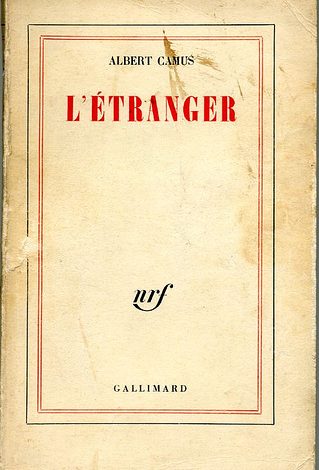The Stranger

L’Étranger (French: [l‿e.tʁɑ̃.ʒe]) is a 1942 novella by French author Albert Camus. Its theme and outlook are often cited as examples of Camus’ philosophy, absurdism coupled with existentialism, though Camus personally rejected the latter label.[1]
The title character is Meursault, an indifferent French settler in Algeria described as “a citizen of France domiciled in North Africa, a man of the Mediterranean, an homme du midi yet one who hardly partakes of the traditional Mediterranean culture.”[2] Weeks after his mother’s funeral, he kills an Arab man in French Algiers, who was involved in a conflict with one of Meursault’s neighbors. Meursault is tried and sentenced to death. The story is divided into two parts, presenting Meursault’s first-person narrative view before and after the murder, respectively.
In January 1955, Camus wrote this:
I summarized The Stranger a long time ago, with a remark I admit was highly paradoxical: “In our society any man who does not weep at his mother’s funeral runs the risk of being sentenced to death.” I only meant that the hero of my book is condemned because he does not play the game.[3]
The Stranger’s first edition consisted of only 4,400 copies, which was so few that it could not be a best-seller. Since the novella was published during the Nazi occupation of France, there was a possibility that the Propaganda-Staffel would censor it, but a representative of the Occupation authorities felt it contained nothing damaging to their cause, so it was published without omissions. However, the novel was well received in anti-Nazi circles in addition to Jean-Paul Sartre’s article “Explication de L’Étranger”.[4]
Translated four times into English, and also into numerous other languages, the novel has long been considered a classic of 20th-century literature. Le Monde ranks it as number one on its 100 Books of the Century.
The novel was twice adapted as films: Lo Straniero (1967) (Italian) by Luchino Visconti and Yazgı (2001, Fate) by Zeki Demirkubuz (Turkish).
Meursault learns of the death of his mother, who has been living in a retirement home in the country. He takes time off of work to attend her funeral, but he shows none of the indications of grief or mourning that the people around him expect from someone in his situation. When asked if he wishes to view the body, he declines, and he smokes and drinks coffee at the vigil held by his mother’s coffin the night before the burial. Most of his comments to the reader at this time are about his observations of the aged attendees at the vigil and funeral, which takes place on an unbearably hot day.
Back in Algiers, Meursault encounters Marie, a former secretary of his firm. The two become re-acquainted, go swimming, watch a comedy film, and begin to have a sexual relationship. All of this happens on the day after his mother’s funeral.
